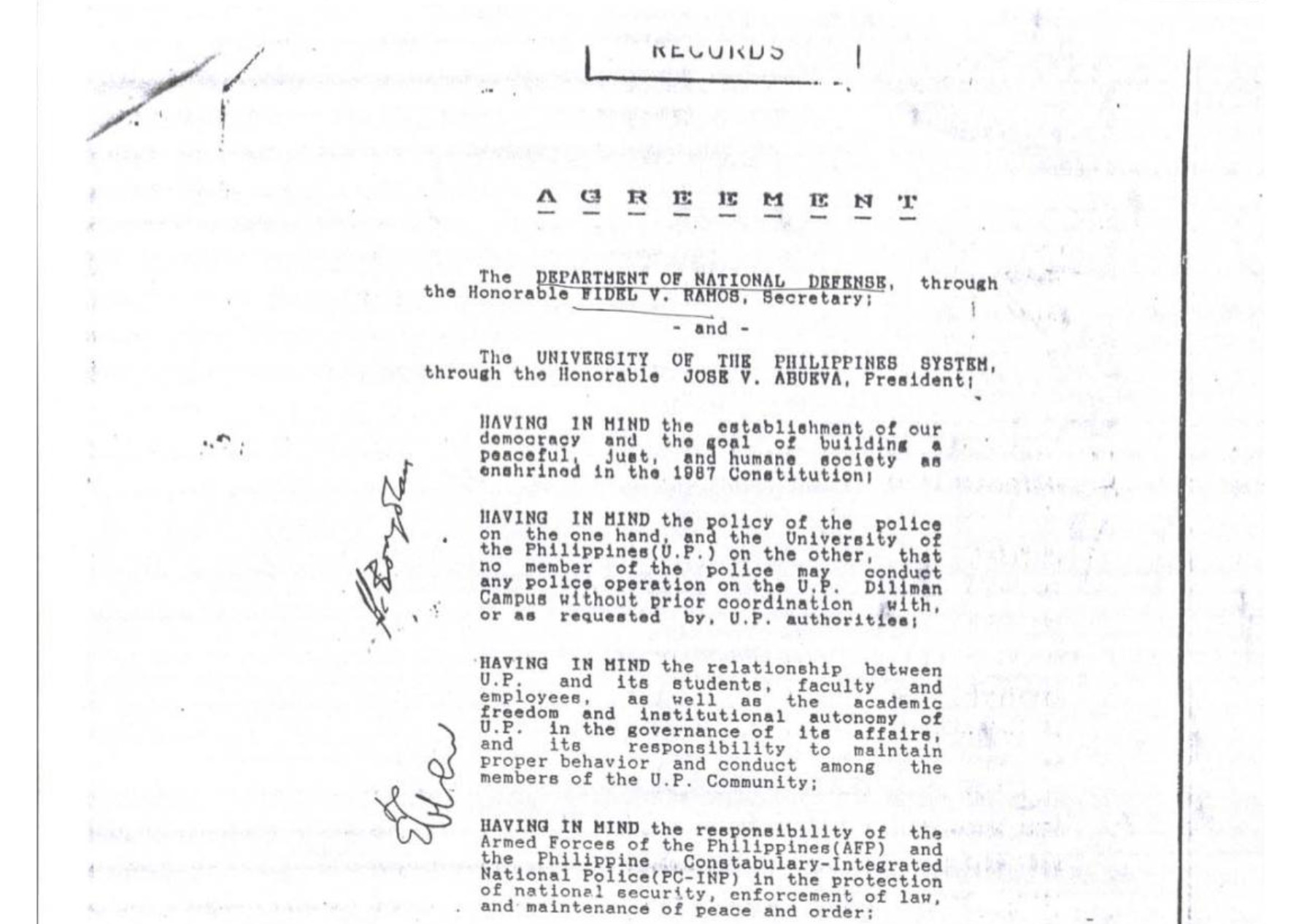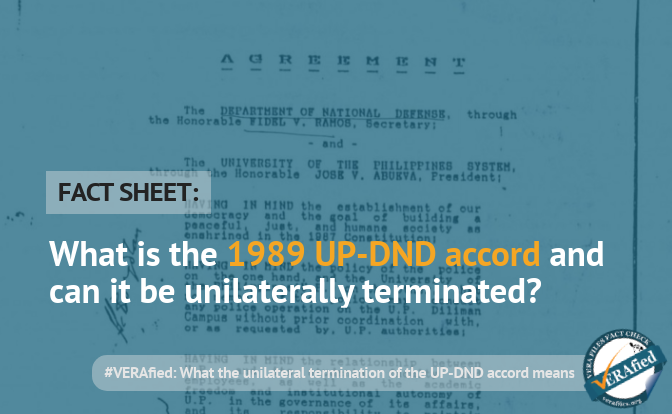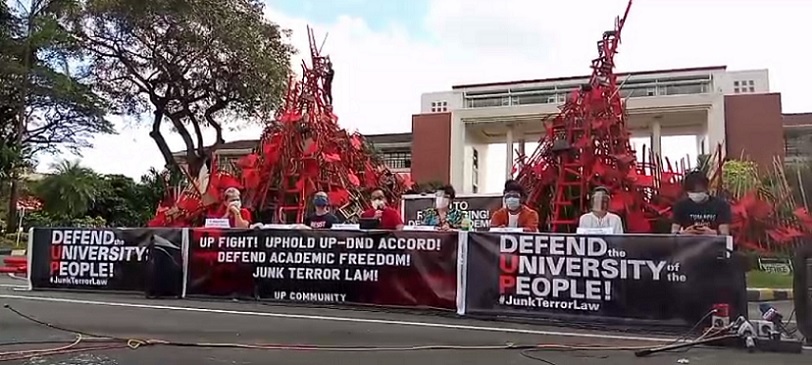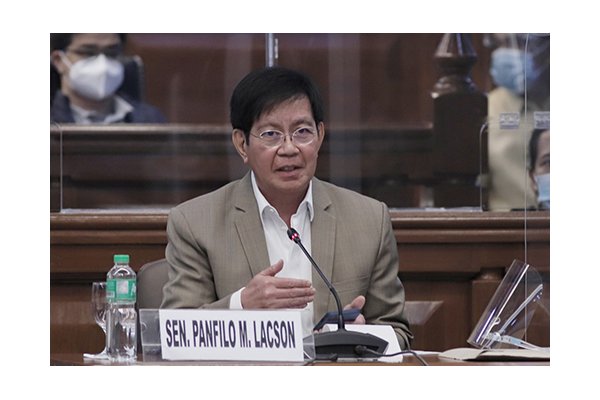
(UPDATED) Defense Secretary Delfin Lorenzana has unilaterally abrogated the department’s 1989 agreement with the University of the Philippines (UP), which prevented state forces from entering and conducting operations inside its campuses without prior notification.
In a letter dated Jan. 15, uploaded on Twitter by the Office of the Student Regent on Jan. 18, Lorenzana informed UP president Danilo Concepcion of the termination, saying the department “finds [the agreement] as a hindrance in providing effective security, safety and welfare of the students, faculty, and employees of UP.”
The secretary said “recent events undeniably show” that a number of UP students have been identified as members of the Communist Party of the Philippines – New People’s Army (CPP-NPA).
He added, without providing any evidence, that the Department of National Defense (DND) is “aware that there is indeed an ongoing clandestine recruitment inside UP campuses nationwide for the membership in the CPP-NPA,” and that the agreement was “being used” by recruiters and supporters “as a shield” against law enforcers.
The CPP-NPA has been designated by the Anti-Terrorism Council, composed of key Cabinet officials, as a “terrorist organization,” but has not yet been officially outlawed by the Court of Appeals in accordance with Republic Act 11479 or the Anti-Terrorism Act of 2020 (ATA). (See VERA FILES FACT SHEET: The dangers of red-tagging under the Anti-Terrorism Law)
Membership in the CPP is not, and has not been illegal since former president Fidel V. Ramos repealed in 1992 the 1957 Anti-Subversion Law.
What exactly is the UP-DND accord and why does its termination matter?
Here are five things you need to know on the issue:
1. What is the UP-DND agreement?
Inked in 1989, the UP-DND agreement outlines the terms and conditions by which the military and police can enter and operate within the premises of any of the UP campuses across the country, according to a copy of the accord uploaded by the Philippine Collegian in 2015.
Under the agreement, state forces are prohibited from entering a UP campus without first notifying either the university president, or the chancellor or dean of the concerned constituent university or regional unit, “except in cases of hot pursuit and similar occasions of emergency” or “ordinary transit.”
It expressly prohibits law enforcement officials from interfering with peaceful protest actions by UP constituents within university premises, and contains strict guidelines on the issuance of search and arrest warrants against, and detention of, its students, faculty, and employees.
The 31-year-old agreement — signed by former UP president Jose Abueva and Ramos, who was then Defense chief, in June 1989 — was based on the earlier accord between student leaders Sonia Soto, former chair of the League of Filipino Students (LFS), JV Bautista, then president of the College Editors’ Guild of the Philippines, and Manny Ceneta, former chair of the Youth for Nationalism and Democracy, and then Defense minister Juan Ponce Enrile in 1982.
The terms in the 1982 accord were expressed in Enrile’s letter to Soto, Bautista, and Ceneta dated October 1981, published in the UP Gazette (see p. 110).
In separate posts on social media, Bagong Alyansang Makabayan (Bayan) secretary general Renato Reyes and UP journalism professor Danilo Arao said it was the “violent abduction and arrest” of Donato Continente, a staff of the Philippine Collegian, inside the UP Diliman campus on June 16, 1989 that led to the UP-DND accord.
Continente, among the accused in the murder of United States Col. James Rowe of the Joint U.S. Military Advisory Group, was sentenced to life imprisonment in 1991 by a lower court. He was freed in 2005 after 14 years of imprisonment following the Supreme Court’s (SC) downgrading of his sentence in 2000, having ruled that he was only an accomplice to the murder.
Until his release, Continente has denied any hand in Rowe’s assasination, saying he was tortured by state forces and “forced to admit” to the crime, based on several news reports.
2. Can DND unilaterally terminate the agreement?
The 1989 accord did not outline terms and conditions on how it can or should be abrogated. However, some lawyers and legal groups have said that the agreement cannot simply be terminated by just one party.
Human rights lawyer Jose Manuel “Chel” Diokno, chairperson of the Free Legal Assistance Group (FLAG) and dean of the De La Salle University College of Law, in a tweet, cited Art. 1308 of the Civil Code of the Philippines, which states that a contract “must bind both contracting parties; its validity or compliance cannot be left to the will of one of them.”
The law defines a contract as the “meeting of minds between two persons whereby one binds himself, with respect to the other, to give something or render some service.”
In his letter, Lorenzana cited a provision in the agreement that said “nothing herein shall be construed as a prohibition against the enforcement of the laws of the land,” which, he said, means the two parties understood the responsibility of law enforcement agencies in “implementing the laws without hindrance” as long as it is within the prescribed procedures mandated by law. Thus, the secretary argued, making the agreement “moot and academic.”
But lawyer Tony La Viña, former dean of the Ateneo de Manila University School of Government, said in a Facebook status that the agreement is “based on UP’s academic freedom, enshrined not just in its Charter (RA 9500) but also in the 1987 Philippine Constitution.”
In DLSU vs. CA, the SC said Sec. 5(2), Art. XIV of the Constitution:
“…guaranties (sic) all institutions of higher learning academic freedom. This institutional academic freedom includes the right of the school or college to decide for itself, its aims and objectives, and how best to attain them free from outside coercion or interference save possibly when the overriding public interest calls for some restraint.”
Source: Elibrary.judiciary.gov.ph, GR 127980, Dec. 19, 2007
La Viña said the DND letter “failed to show any overriding public interest to interfere with UP’s academic freedom” and “did not show any clear and present danger which can limit a student or a professor’s civil liberty to freely think and express his or her view.”
3. What can happen now after the DND has ‘terminated’ the agreement?
Without the accord, nothing prevents state forces from conducting operations within the premises of UP campuses nationwide.
But even prior to the DND’s termination, law enforcement agencies did not always adhere to the agreement’s terms. In June last year, during a protest in Cebu City against the passage of the ATA, police arrested seven students and members of progressive groups, and one bystander “within the vicinity” of the UP Cebu campus for supposedly violating the ban on mass gatherings. (See VERA FILES FACT CHECK YEARENDER: The two faces of COVID-19 lockdown in the Philippines)
After a probe, the UP Cebu administration demanded the “immediate release of our students and alumni who were unduly arrested and detained, along with four others, for exercising their right to peaceful assembly in our campus.” In a statement, it said the constitutional right to peaceful assembly is “not proscribed even under the current national emergency,” and called on local police officials to “uphold and respect” the UP-DND accord.
A local court ordered the release of the so-called “Cebu 8” without bail three days after they were arrested, though they were still charged with unlawful assembly, among others.
The Commission on Human Rights (CHR), which launched its own investigation on the incident, also referenced in its statement the UP-DND accord, which, it said, “serves as a safeguard to ensure that schools remain as safe spaces for intellectual discussions and tackling of social issues and concerns without fear of reprisal or retaliation.”
In his Jan. 15 letter, Lorenzana maintains that DND “do[es] not intend to station military or police inside UP campuses nor [does it] wish to suppress activist groups, academic freedom and freedom of expression.”
Two UP constituent universities — UP Diliman and UP Los Baños — have their own police force, which are not under the jurisdiction of the Philippine National Police. Others, including UP Visayas and UP Manila, have their own “security force” or guards, Elena Pernia, UP vice president for public affairs, told VERA Files in a phone interview on Jan. 21.
4. So, what does the termination mean?
In his reply to the secretary’s letter, Concepcion said the unilateral abrogation was “totally unnecessary and unwarranted” and “may result in worsening rather than improving relations between our institutions.”
He said the UP community “do[es] not condone sedition, armed insurrection, or the use of violence for political ends,” adding:
“At the same time, especially given our experience of martial law, we must reject any form or semblance of militarization on our campuses, which will have a chilling effect deleterious to academic freedom.”
Source: University of the Philippines official Facebook page, “Protect academic freedom” — UP President Danilo L. Concepcion responses to DND’s unilateral abrogation of the UP-DND Accord, Jan. 19, 2020
Concepcion then urged Lorenzana to “reconsider and revoke” the abrogation. In a speech during a protest action in UP Diliman on Jan. 19, he said in Filipino that the 1989 accord “gives freedom to students and teachers to be creative and bold in thought and action because they know that no one can silence them.”
Many have publicly expressed concern and opposition over the termination, including Soto, who signed the agreement on which the 1989 UP-DND accord was based, Vice President Leni Robredo, and some lawmakers.
In her statement posted on Facebook, Robredo said the accord — signed at a time when the “atrocities inflicted by the Marcos dictatorship and its armed agents on members of the University community” was still fresh — was “an effort” to ease the doubts of the public that the “reign of violence and terror that held sway during the dictatorship had never really gone away.”
She said DND’s move now sends the opposite message: “That under this administration, anyone, anywhere, at anytime (sic), is fair game.”
Following the backlash, Lorenzana, in a series of tweets, said the agreement has become “obsolete” since “the times and circumstances have changed.” He maintained that the decision to terminate the accord was “rooted in our concern for the safety of the youth.”
5. What is the president’s position on the termination?
In a press briefing on Jan. 19, Palace Spokesperson Harry Roque — himself an alumnus and former UP law professor — said President Rodrigo Duterte “supports” Lorenzana’s decision to terminate the accord.
The Duterte administration has linked members of the UP community to the CPP-NPA on numerous occasions.
In November last year, no less than the president accused the country’s premier state university of “recruiting communists,” and threatened to defund it after “mistaking” its students for those of the Ateneo, who went on an academic strike to protest the government’s “mismanagement” of the pandemic and other crises.
In January 2019, the Philippine National Police, citing the testimony of alleged ex-rebels, claimed that students from UP and the Polytechnic University of the Philippines were brought to Laguna for immersion activities and “forced” to join the NPA.
In a statement following the incident, then UP Diliman chancellor Michael Tan said that, while all out-of-classroom activities of students must be cleared by the university in the interest of safety, students “need to explore and appreciate the world outside of UP and to develop their competencies, linked to social realities.” Tan also recounted instances in 2018 when students doing field work in rural areas were “harassed” by military personnel “simply because [they] were from UP.”
Also in 2018, the Armed Forces of the Philippines named UP as one of the 18 Metro Manila schools tagged in its alleged communist-driven “Red October” ouster plot. The CHR then said the “blanket act of red-tagging” by the military put students in danger. (See VERA FILES FACT SHEET: Why ‘red-tagging’ is dangerous)
UPDATE: On Jan. 26, lawyer Severo Brillantes, in a post on the Facebook page of Brillantes Law, said, contrary to this fact sheet, it is “not true that without the accord, nothing prevents state forces from conducting operations within the premises of UP campuses nationwide.”
Here is the post in full:
“FACT-CHECKING VERA Files, PLEASE CHECK YOUR FACTS. It is not true that without the Accord, nothing prevents state forces from conducting operations within the premises of UP campuses nationwide. Conversely, it is also not true that they cannot be barred from entering any of the UP campuses or avoid giving notification of their presence to the UP authorities.
BP 880 (The Public Assembly Act) provides that public assemblies may be held inside UP campuses even without a permit. Law enforcement agencies therefore shall not interfere with the holding thereof and may be stationed only in a place at least one hundred (100) meter away from the area of activity ready to maintain peace and order at all times.
Not just any policeman for instance can conduct an operation inside the University premises. He must be armed with the proper legal documents, absent which UP security guards may lawfully bar his entry into the UP premises (or direct him to leave if his presence is found out). Any police operation would require a Pre-Operational Clearance from their superiors.
In serving Arrest or Search warrants, they cannot lawfully just force their way inside school buildings or enclosures. They are required to announce their authority and purpose. In the case of conducting searches, they necessarily have to do so in the presence of the lawful occupants thereof which could only be the U.P. authorities.”
However, lawyer Joel Butuyan, president of the Center for International Law (CenterLaw), told VERA Files in a Jan. 31 email that the statement in question “remains true.”
He said BP 880 “does not bar policemen from entering UP, and they don’t need to notify UP of their presence. ‘Shall not interfere’ is not equivalent to [‘]shall not enter UP premises.[’]”
Butuyan said it “doesn’t make a difference if a policeman enters UP with pre-operational clearance. The fact remains that a policeman can now enter UP without prior coordination with UP authorities.” The issuance of pre-operational clearances are “now the unilateral decisions of police officers, and which they issue almost automatically to their police operatives,” he added.
He also said the requirement for police to “‘announce their authority and purpose’ when they serve warrants is a requirement in all cases,” even in schools that do not have an agreement similar to the UP-DND accord.
“[T]his cannot be used to say that the scrapping of the DND-UP accord makes no [difference]. It does make a lot of difference because police and military operatives can now enter UP campuses without the special conditions required under the accord,” he said.
Butuyan is a trustee of the board of VERA Files.
Lawyer Romel Bagares, in a separate email to VERA Files on Jan. 31, said the statement, “without the accord, nothing prevents state forces from conducting operations within the premises of UP campuses nationwide,” is “borne by facts, and proceeds from experience itself.”
He noted that “immediately” after Lorenzana unilaterally abrogated the agreement, soldiers reportedly from the Armed Forces of the Philippines Joint Task Force National Capital Region visited an urban gardening project inside the UP Diliman campus in Quezon City.
Bagares said police “may very well notify UP officials that they are sending patrol cars to campus on a daily basis to protect peace and order. But that would forever change the UP academic landscape.”
“Clearly, the message is to intimidate, to send a chilling effect on academic freedom, to cow a UP that has been known for a long history of critical public engagement into silence,” he added.
Editor’s note: VERA Files is one of the petitioners against the Anti-Terrorism Act of 2020 before the Supreme Court.
Editor’s note: This article was updated to reflect additional information on the police and security forces inside UP campuses.
Sources
UP Office of the Student Regent official Twitter account, “ALERT: DND Secretary Delfin Lorenzana sent a letter to UP President Danilo Conception…,” Jan. 18, 2021
Anti-Terrorism Council, CPP/NPA AND ISLAMIC STATE EAST ASIA AND ASSOCIATED GROUPS DESIGNATED AS TERRORIST GROUPS, December 2020
Anti-Terrorism Council, Resolution No. 12, Dec. 9, 2020
Official Gazette, RA 11479, July 3, 2020
Official Gazette, RA 7636, Sept. 22, 1992
Elibrary.judiciary.gov.ph, RA 1700, June 20, 1957
Philippine Collegian, 1989 agreement between UP and DND on military and police operations in the UP system, Oct. 22, 2015
Sonia Sotto Facebook account, “Para sa mga naghahanap ng kopya ng Soto-Enrile Accord na pinagbatayan ng UP-DND Agreement…,” Jan. 19, 2021
UP Office of the Secretary of the University, The University of the Philippines Gazette Vol. XII(4), p. 110-111, 1981
Renato Reyes Facebook account, “Ang unilateral na pagbasura ng DND sa makasaysayang UP-DND Accord…,” Jan. 19, 2021
Danilo Arao official Twitter account, “1989: As a news writer of the Philippine Collegian…,” Jan. 18, 2021
UP Office of the Secretary of the University, The University of the Philippines Gazette Vol. XX(3), p. 80, 1989
Donato Continente case
- United Press International, Suspect charged in slaying of U.S. army officer, June 21, 1989
- AP Archive, Man jailed for US General’s murder released after 14 years, July 21, 2015
- Chan Robles Virtual Law Library, People vs Continente et al., Aug. 29, 2001
- Lawphil.net, G.R. Nos. 100801-02, Aug. 25, 2000
- Philstar.com, Continente free, denies killing Rowe, June 29, 2005
- Manila Times, Accomplice to Rowe killing freed after 14-year jail term, June 29, 2005
- Bulatlat, Suspected U.S. Colonel Assassin Donato Continente: Free at last?, Jan. 16, 2005
National Union of Peoples’ Lawyers, “Pahayag ng UP National Union of Peoples’ Laywers…,” Jan. 19, 2021
UP Law Student Government, UNITY STATEMENT ON THE UNILATERAL TERMINATION OF THE UP-DND AGREEMENT BY DND SECRETARY DELFIN LORENZANA, Jan. 18, 2021
Jose Manuel “Chel” Diokno official Twitter account, “Malinaw sa Art. 1308 ng Civil Code…,” Jan. 19, 2021
Official Gazette, RA 386, June 18, 1949
Tony La Viña Facebook page, “United we stand. Divided is not an option…,” Jan. 19, 2021
Official Gazette, RA 9500, April 19, 2008
Elibrary.judiciary.gov.ph, GR 127980, Dec. 19, 2007
Official Gazette, 1987 Constitution
UP Cebu incident
- Inquirer.net, 7 Cebu students protesting against anti-terrorism bill nabbed, June 5, 2020
- CNN Philippines, Seven arrested during anti-terrorism bill protest in Cebu City, June 5, 2020
- Rappler, U.P. Cebu to probe whether cops violated U.P.-DND accord in arrest of protesters, June 5, 2020
- University of the Philippines Cebu official Facebook page, Initial statement of UP Cebu Chancellor, June 5, 2020
- University of the Philippines Cebu official Facebook page, Official Statement of UP Cebu Administration, June 7, 2020
- CNN Philippines, Court orders release of ‘Cebu 8’ arrested at anti-terrorism bill rally, June 8, 2020
- ABS-CBN News, ‘Cebu 8’ released on orders of court, June 8, 2020
- Inquirer.net, ‘Cebu 8’ in protest vs Anti-Terrorism Bill released from jail, June 8, 2020
- Commission on Human Rights, Statement of CHR Spokesperson, Atty. Jacqueline Ann de Guia, on the arrest of 8 protesters in UP Cebu due to alleged violation of quarantine rules, June 10, 2020
University of the Philippines official Facebook page, “Protect academic freedom” — UP President Danilo L. Concepcion responses to DND’s unilateral abrogation of the UP-DND Accord, Jan. 19, 2020
Philippine Collegian, “Panoorin ang pahayg ni UP Pres. Danilo Concepcion…,” Jan. 19, 2021
CLTV 36 News Facebook page, SONIA SOTO’s OFFICIAL STATEMENT ON THE TERMINATION OF UP-DND ACCORD, Jan. 19, 2021
VP Leni Robredo official Facebook page, “Statement of Vice President Leni Robredo on the termination of the 1989 UP-DND Accord…,” Jan. 19, 2021
Senate.gov.ph, Proposed Senate Resolution 616, Jan. 19, 2021
Sarah Elago Twitter account, “#DefendAcademicFreedom FILED: HR expressing the sense of the House of Representatives to uphold the UP-DND Accord and the academic freedom of institutions of higher learning…,” Jan. 20, 2021
Delfin Lorenzana official Twitter account, “The agreement has become obsolete…,” Jan. 19, 2021
Delfin Lorenzana official Twitter account, “The abrogation of the UP-DND agreement is a decision rooted in our concern for the safety of our youth…,” Jan. 19, 2021
Presidential Communications Operations Office, Press Briefing of Presidential Spokesperson Harry Roque, Jan. 19, 2021
Ateneo students strike
- RTVMalacanang, Meeting on COVID-19 Concerns and Talk to the People on COVID-19 11/17/2020, Nov. 17, 2020
- ABS-CBN News, Defund UP? Duterte ‘somehow confused’ state university with Ateneo, after call for #AcademicStrike, Nov. 18, 2020
- GMA News Online, Duterte ‘somehow confused’ proponents of academic strike -Roque, Nov. 18, 2020
- Philippine News Agency, PRRD message on strike should be for Ateneo students: Roque, Nov. 18, 2020
- Philstar.com, Government response to typhoons, pandemic leaves students up in protest, Nov. 23, 2020
- Manila Bulletin, Ateneo students demand actions from gov’t over response to pandemic, typhoons, Nov. 23, 2020
- Rappler, Ateneo Student Strike Manifesto, n.d.
Inquirer.net, UP, PUP students being forced to join NPA, says ex-rebels, Jan. 14, 2019
CNN Philippines, Surrendered rebels claim UP, PUP students threatened into joining NPA, Jan. 14, 2019
BusinessWorld, Police says students of UP, PUP ‘immerse’ in communist camps, Jan. 14, 2019
UP Diliman Office of the Chancellor, Statement on Allegations of UP Students Being Forced to Join the NPA, Jan. 15, 2019
Commission on Human Rights, ON THE LIST OF UNIVERSITIES ALLEGEDLY LINKED TO “RED OCTOBER”, Oct. 4, 2018
(Guided by the code of principles of the International Fact-Checking Network at Poynter, VERA Files tracks the false claims, flip-flops, misleading statements of public officials and figures, and debunks them with factual evidence. Find out more about this initiative and our methodology.)



